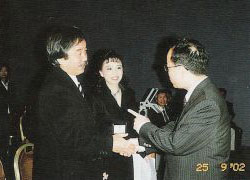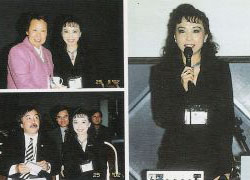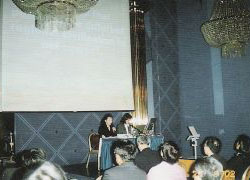Archilife Delegation for SB2002 International Conference(1) (Part: 5)
|
9月25日上午,由黃晉英秘書長擔任主席兼主講人,帶領Prof. Kazuo Iwamura、Prof. William Lim、Prof. Wan Ki Chow、本會委託研究案主持人郭肇立教授、喻肇青教授、江哲銘教授及蘇慶華教授進行為時90分鐘的專題演講。本會歷屆得獎人、現任行政院經建會副主委的張景森先生以及天下雜誌殷允芃總編輯也特地趕來共襄盛舉。首先由黃晉英秘書長登台演講「A New Sustainable Approach-Challenge of Subtropical Region」:「為了徹底解決環境惡化的問題,祐生在創辦人林董事長的帶領之下,歷經24個年頭的辛勤耕耘,包括:籌設知識庫、提供相關研究獎學金、吸收優秀研究人才、填補研究不足的相關課題、展開為期10年的 "下世代居住規格" 之研究,企圖找尋屬於台灣在地的居住規格,到l996年組成 "桑思特組" 將10年中所產生的l55篇獎助論文以及26組委託主題研究論文,經由34次研討會議彙集成 "l999桑思報告" ,發表桑思宣言,提出20項指標,做為我們邁向與環境對話的基礎。同時為擴大研究的基礎,從1990年開始由175位優秀的青年學者編寫知識庫的索引書整合知識等等,終於有了初步的成果。  我們相信盲目追隨不同地理氣候區塊的文明是不正確的,必要展開與自身所處的地理氣候區環境對話,藉知識、科技的整合,重新調適在地建築與聚落形式,才能發展出最佳化的模式,做為減輕環境負荷與去除資源、能源緊張的根本手段。而且我們也越來越明瞭人類的發展與環境的保育間應取法生物間常見的 "共生關係" 。因此,l996年後利用前階段的成果為核心擴張到它的外圍空間,企圖建構一個高效率的共生循環系統,來減輕生活起居對環境所形成的負荷,這一種對策,我們稱它為 "共生化" 。也就是藉著生物學上的互利共生將我們食用的食物,尤其是綠色的蔬果,藉助建築構造,如植栽塔及乾式馬桶等,使它跟起居者緊密結合,讓我們的Output成為植物的Input,植物的Output變成我們的Input,希望隨著循環效率的提升從而收斂生活起居行為對外部的負荷。同時,也希望綠色植物的蒸散作用,能讓台灣地理區位特性的高溫在建築物的外牆得以下降。此外在構造上,我們取法亞熱帶原住民及古羅馬人控制溫濕度的智慧,綜合設計成單體實驗室,先證實構造的可行性及測定建築性能,再將初步的成果轉為單元建築體,進行更為完整的綜合實驗,企圖將生物界常見的共生關係變成我們與環境對話的新關係。而綠建築結合共生化對策更將是入類未來通往永續建築的良方。以下三個結論謹提供參考之:一、建築構造必要有能力回應當地的環境與氣候,同時也要維持起居者的舒適與健康;二、永績是複合的議題,必要以多層次、多面向的團隊合作,才有可能提出周全的解決方案,同時持續的實驗、精進、執行、反饋,才能真正與環境對話;三、 "共生化" 是一種法自然的小共生模式,人類要與綠色蔬果為主的生物建立更緊密的共生關係才能不破壞自然,讓自然環境可以永續。現在台灣的陳總統接納並採用了祐生的理念,把他的治國藍圖定名為『綠色矽島』祐生也為他繪製了台灣的第一幅綠色地圖,這或許也可以提供給西方先進國一個參考,讓人類的永續要向前邁進一大步。」 我們相信盲目追隨不同地理氣候區塊的文明是不正確的,必要展開與自身所處的地理氣候區環境對話,藉知識、科技的整合,重新調適在地建築與聚落形式,才能發展出最佳化的模式,做為減輕環境負荷與去除資源、能源緊張的根本手段。而且我們也越來越明瞭人類的發展與環境的保育間應取法生物間常見的 "共生關係" 。因此,l996年後利用前階段的成果為核心擴張到它的外圍空間,企圖建構一個高效率的共生循環系統,來減輕生活起居對環境所形成的負荷,這一種對策,我們稱它為 "共生化" 。也就是藉著生物學上的互利共生將我們食用的食物,尤其是綠色的蔬果,藉助建築構造,如植栽塔及乾式馬桶等,使它跟起居者緊密結合,讓我們的Output成為植物的Input,植物的Output變成我們的Input,希望隨著循環效率的提升從而收斂生活起居行為對外部的負荷。同時,也希望綠色植物的蒸散作用,能讓台灣地理區位特性的高溫在建築物的外牆得以下降。此外在構造上,我們取法亞熱帶原住民及古羅馬人控制溫濕度的智慧,綜合設計成單體實驗室,先證實構造的可行性及測定建築性能,再將初步的成果轉為單元建築體,進行更為完整的綜合實驗,企圖將生物界常見的共生關係變成我們與環境對話的新關係。而綠建築結合共生化對策更將是入類未來通往永續建築的良方。以下三個結論謹提供參考之:一、建築構造必要有能力回應當地的環境與氣候,同時也要維持起居者的舒適與健康;二、永績是複合的議題,必要以多層次、多面向的團隊合作,才有可能提出周全的解決方案,同時持續的實驗、精進、執行、反饋,才能真正與環境對話;三、 "共生化" 是一種法自然的小共生模式,人類要與綠色蔬果為主的生物建立更緊密的共生關係才能不破壞自然,讓自然環境可以永續。現在台灣的陳總統接納並採用了祐生的理念,把他的治國藍圖定名為『綠色矽島』祐生也為他繪製了台灣的第一幅綠色地圖,這或許也可以提供給西方先進國一個參考,讓人類的永續要向前邁進一大步。」In the morning on September 25, Secretary General Huang Chin-ying, the chairperson and speaker, took Professor Kazuo Iwamura, Professor William Lim, Professor Wan Ki Chow and  principal investigators of ARF research projects, including Professor Kuo Chao-lee, Professor Yu Chao-ching, Professor Chiang Che-ming, and Professor Su Ching-hua, to the 90-minute keynote speech. ARF scholars, CEPD Deputy Minister Chang Chin-shen, and Common Wealth Editor-in-Chief Yin Yun-fan also attended the speech to express their support for ARF. First, Secretary General Huang Chin-ying gave the speech "A New Sustainable Approach─Challenge of Subtropical Region" :, "To find a radical solution for environmental deterioration, under the leadership of President Lin Chun-shin, founder of ARF, the AFR has spent 24 years of hard work to find these solutions. These included the establishment of a knowledge base, provision of scholarships for researches on related topics, recruitment of excellent researchers, filling up issues of inadequate researches, and we opened a ten-year research project to find "The Model of Next Generation". Till 1996, we formed a SONGS team, stood for " Specifications of Next Generation Settlements ". The SONGS team compiled 155 papers and caught the results of 26 research projects. Through 34 meetings, they proposed "The Declaration of SONGS", Next generation (by the year 2025),in which 20 indices were offered as the basis for dialogue with our environment. Moreover, in order to extending the research's achievements, since 1990, 175 outstanding keepers began to compile index books to integrate the knowledge, marking the achievements of our preliminary research. We believe that it is incorrect to blindly follow the civilizations of different geographical and climatic zones, and it is necessary to start a conversation with the geographical and climatic zone where our country lies. This way, we can re-adjust the form of local buildings and settlements through knowledge and technology integration in order to develop the optimal model for reducing environmental load and releasing resource and energy tensions radically. Then, we realize we should catch the natural law about the biological sense and try to build a symbiotic high efficient recycling system. principal investigators of ARF research projects, including Professor Kuo Chao-lee, Professor Yu Chao-ching, Professor Chiang Che-ming, and Professor Su Ching-hua, to the 90-minute keynote speech. ARF scholars, CEPD Deputy Minister Chang Chin-shen, and Common Wealth Editor-in-Chief Yin Yun-fan also attended the speech to express their support for ARF. First, Secretary General Huang Chin-ying gave the speech "A New Sustainable Approach─Challenge of Subtropical Region" :, "To find a radical solution for environmental deterioration, under the leadership of President Lin Chun-shin, founder of ARF, the AFR has spent 24 years of hard work to find these solutions. These included the establishment of a knowledge base, provision of scholarships for researches on related topics, recruitment of excellent researchers, filling up issues of inadequate researches, and we opened a ten-year research project to find "The Model of Next Generation". Till 1996, we formed a SONGS team, stood for " Specifications of Next Generation Settlements ". The SONGS team compiled 155 papers and caught the results of 26 research projects. Through 34 meetings, they proposed "The Declaration of SONGS", Next generation (by the year 2025),in which 20 indices were offered as the basis for dialogue with our environment. Moreover, in order to extending the research's achievements, since 1990, 175 outstanding keepers began to compile index books to integrate the knowledge, marking the achievements of our preliminary research. We believe that it is incorrect to blindly follow the civilizations of different geographical and climatic zones, and it is necessary to start a conversation with the geographical and climatic zone where our country lies. This way, we can re-adjust the form of local buildings and settlements through knowledge and technology integration in order to develop the optimal model for reducing environmental load and releasing resource and energy tensions radically. Then, we realize we should catch the natural law about the biological sense and try to build a symbiotic high efficient recycling system.  We call it "Symbiosis". It is based on the biological sense. We have a Vertical Planting System beside the construction wall. Through the dry toilet, our output will be the nutrition of the plants, and the output of plants will be our food. We hope through this high efficient recycling system, it might help to release the burden of the environment. Also, by the evaporation of plants, it might help to cool down the high temperature. Besides, as to the construction, learning the wisdom that both of subtropical aboriginals and ancient Romans control the temperature and humidity, we build a chamber to prove its possibility and test its performances. All the results could be adopted by a new community. We believe that Symbiosis will make our living free from the burden of environment This is what we have been approaching. And, we also reach a conclusion that composing the Green Building and "Symbiosis" will be the formula for pursuing Sustainable Building. The following three conclusions are drawn for your reference: (1)Buildings should have the ability to respond to its local environment and climate, while also providing for the comfort and health of its inhabitants.(2)Sustainability is a complex issue. It needs to be discussed on many different levels and aspects in order to come up with a comprehensive solution. Moreover, real dialogue with our environment will require continued experimentation, refinement, implementation and feedback.(3) "Symbiosis" is a micro-scale symbiotic approach with mimicry of nature. It requires that people establish an intimate symbiotic relationship with the biological world, and particularly with the vegetables and fruits. It is in order to minimize their impact on nature and ensure environmental sustainability. Now that President Chen Shui-bian of Taiwan has accepted our ideas and defined his administrative blueprint as the 'Green Silicon Island'. We have also made Taiwan's first green map for him. This can be a reference for advanced countries in the Western world to bring humans a big step forward toward sustainability." We call it "Symbiosis". It is based on the biological sense. We have a Vertical Planting System beside the construction wall. Through the dry toilet, our output will be the nutrition of the plants, and the output of plants will be our food. We hope through this high efficient recycling system, it might help to release the burden of the environment. Also, by the evaporation of plants, it might help to cool down the high temperature. Besides, as to the construction, learning the wisdom that both of subtropical aboriginals and ancient Romans control the temperature and humidity, we build a chamber to prove its possibility and test its performances. All the results could be adopted by a new community. We believe that Symbiosis will make our living free from the burden of environment This is what we have been approaching. And, we also reach a conclusion that composing the Green Building and "Symbiosis" will be the formula for pursuing Sustainable Building. The following three conclusions are drawn for your reference: (1)Buildings should have the ability to respond to its local environment and climate, while also providing for the comfort and health of its inhabitants.(2)Sustainability is a complex issue. It needs to be discussed on many different levels and aspects in order to come up with a comprehensive solution. Moreover, real dialogue with our environment will require continued experimentation, refinement, implementation and feedback.(3) "Symbiosis" is a micro-scale symbiotic approach with mimicry of nature. It requires that people establish an intimate symbiotic relationship with the biological world, and particularly with the vegetables and fruits. It is in order to minimize their impact on nature and ensure environmental sustainability. Now that President Chen Shui-bian of Taiwan has accepted our ideas and defined his administrative blueprint as the 'Green Silicon Island'. We have also made Taiwan's first green map for him. This can be a reference for advanced countries in the Western world to bring humans a big step forward toward sustainability."
|
Related Files
 :
1147
:
1147
 :
31.49 KB
:
31.49 KB


